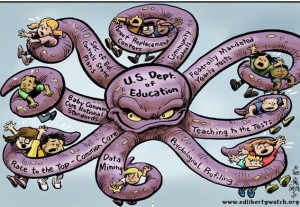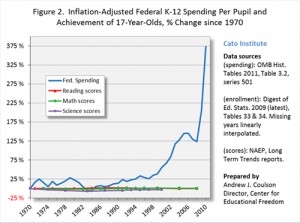Federally Funded National Group Pushes More Social Emotional Standards
Jane Robbins, attorney and senior fellow for the American Principles Project and Shane Vander Hart at Truth in American Education, have both written excellent columns about the dangers of the next big edu fad – social emotional learning standards. Eight states are working with CASEL to adopt them. These are California, Georgia, Massachusetts, Minnesota, Nevada, Pennsylvania, Tennessee, and Washington.
We have long written about the dangerous loss of freedom of conscience and privacy inherent in social emotional research and data gathering via the allegedly academic Common Core aligned tests that are being amplified in the Every Student Succeeds Act’s accountability paradigm. Mrs. Robbins was kind enough to cite Dr. Effrem’s research paper on this topic. Here is an excerpt:
When non-psychologists dabble in these murky waters, the result is tremendously subjective analyses of what a child is thinking or feeling as opposed to what the government thinks he should be thinking or feeling. Dr. Karen Effrem, who has researched and written extensively about the issue of SEL, warns about the subjectivity of this kind of analysis, particularly with young children.
Even prominent SEL proponents caution that assessing students on SEL standards, especially with the common mechanism of student surveys, can be a shot in the dark. Researchers Angela Duckworth and David Yeager have said that “perfectly unbiased, unfakeable, and error-free measures are an ideal, not a reality.” [Read the whole column titled: The Latest Big Education Fad, Social-Emotional Learning, Is As Bad As It Sounds]
CASEL or the Collaborative for Academic, Social and Emotional Learning receives major taxpayer funded grants. Their website says they received funding from the Institute for Education Sciencesthat is also pushing the social emotional research and profiling on students via the Strengthening Education Through Research Act (SETRA):
Goal number one of Goals 2000 says, “All children will start school ready to learn.” As we have documented, this mandate, disguised as a goal, has given rise to the metastatic growth of early childhood programs across the country. In these programs, “ready to learn” has little or nothing to do with preparing young children to learn academic subjects and much to do with indoctrination of our very youngest and most vulnerable children in the most radical of ideologies. Even if accepted by some parents, it is completely wrong to teach ideology to three, four and five year old children. The ideas being promoted include: earth worshiping environmentalism, radical feminism, engendering fear and hatred of our military, and acceptance of homosexuality. It is these principles that are taught to young children and considered part of “social and emotional” development.
Social and emotional development is a large part of another mandate within Goals 2000. Goal eight says, “Every school will promote partnerships that will increase parental involvement and participation in promoting the social, emotional, and academic growth of children.” Notice that academic growth is the lowest priority on that list. That relegation of academics to such a low priority has resulted in an emphasis on work based and service learning out of the classroom, group projects, whole language, fuzzy math, and civics that undermine the principles of freedom within the Declaration of Independence.
It is critical that we as parents fight to protect the hearts and minds of our precious children from this growing threat to their privacy and freedom of thought. We must reject this overt indoctrination of our children and demand an end to psychological data mining inherent in Common Core based teaching, tests, data mining, and competency based education.
Fed Ed Implications of Presidential Primary
Karen R. Effrem, MD – President
Anti-Common Core Senator Ted Cruz suspended his presidential campaign yesterday evening. With pro-Common Core John Kasich mathematically out of the race, Republicans are left with Donald Trump who has called education a core function of the federal government while stating he opposes Common Core.
On the Democratic side, Hillary Clinton supports the standards, voted for No Child Left Behind and Bernie Sanders supported ESSA.
As with everything else, we will need to stay tuned to see what happens with education in this, our beleaguered republic. In the mean time, please help us continue to fight SETRA and the assessment of mindsets in the NAEP.
Message to Congress: Our Children Do Not Exist to Provide Data to Researchers & the Feds!
The US House Education and Workforce Committee recently held a hearing titled “Strengthening Education Research and Privacy Protections to Better Serve Students.” Although there were some great positives such as hearing from a parent from the organization that took down inBloom, The Parent Coalition for Student Privacy, there was an alarmingly pervasive attitude that student data belonged to the government and researchers and that parent concerns about privacy are over blown. What follows is the introduction, a summary of the pros and cons from the hearing, our conclusions and recommendations from our extensively referenced document written by our president, Dr. Karen Effrem – Response to US House Privacy and Research Hearing. A summary of this document is available HERE.
INTRODUCTION:
We are grateful that the committee convened the very important recent hearing, “Strengthening Education Research and Privacy Protections to Better Serve Students, and for the opportunity to comment on it. With the Family Education Rights and Privacy Act being 40 years old; the Strengthening Research Through Education Act (SETRA) continuing dossier building via state longitudinal databases; and the expanded efforts to psychologically manipulate and profile our children via social emotional and mindset assessments in standards, curriculum and tests; it is extremely important that these bills be updated. Government data gathering on our innocent children must be very significantly pared back in content and kept to the local level and privacy protections strengthened. It is not just the data security that is an issue, but the type and amount of data that is gathered.
POSITIVES:
It is wonderful that Rachel Stickland from The Parent Coalition for Student Privacy, an organization that receives no government or special interest funding, founded and composed of parents, which brought down the Bill Gates multi-million dollar inBloom operation, was able to testify. Ms. Stickland did an excellent job given that she was defending herself and parents from three other Big Data witnesses. (See NEGATIVES below).
Some of the questions by members seemed to indicate a good understanding about the dangers of the extensive student data collection taking place and took parental concerns on that topic seriously, particularly Mrs. Foxx, Mr. Thompson, Mr. Brat, and Ms. Bonamici.
Ms. Stickland’s description of the State Longitudinal Data System (SLDS) was excellent and correct, especially the part about the result of this longitudinal data collection resulting in dossiers from birth. This includes genetic data at least in Rhode Island. I would just add that although the funding push for SLDS occurred during the stimulus bill, in a separate provision, in the Race to the Top grants, and in the America COMPETES Act, they were codified in ESRA in 2002 and continue in SETRA, which is why the data transparency language she mentioned is so critical for both SETRA and FERPA. If, as Dr. Hannaway mentioned, it is really true that the data is completely anonymized, this should not be a problem.
This question by Mr. Heck and Ms. Sticklands’s response as reported by Politico:
“He asked whether Common Core has ‘required new depths of data mining’ of students. ‘I’ve heard the same concerns from parents across the country,’ said Rachael Stickland, Parent Coalition for Student Privacy co-founder and co-chairwoman. ‘There’s a lot of new measurements of student achievement that doesn’t necessarily have academic purposes – grit and tenacity and those sorts of things, the sort of emotional factors. There are a lot of parents who are very, very concerned about this.’”
This is not just a concern, but absolute fact, and we applaud her for saying so. There is much evidence that non -academic social emotional teaching is being promoted through Common Core standards which means that there is psychological data gathering happening in the federally mandated mostly Common Core state tests.
NEGATIVES AND MISSED OPPORTUNITIES:
CONCLUSIONS:
We believe that student privacy and parental consent should always be considered pre-eminent compared to the research desires of the government or private sector, especially in the realm of psychological profiling.
The government has no constitutional, statutory, or moral right to collect data on highly personal and sensitive socioemotional data on our children.
According to data presented to this committee by the Cato Institute several years ago, federal involvement in education has yielded either stagnant or declining academic performance:
The vast majority of federal education programs are unconstitutional because the entire US Department of Education is unconstitutional, meaning that most of these programs should be eliminated with any remaining that can be shown to be effective and constitutional programs being block granted to the states.
Many studies showing the ineffectiveness and or harm of current government education and child social programs and the effectiveness of two parent family structure and other non-government academic and social measures are ignored raising the question of why we need so much research in the first place.
RECOMMENDATIONS:
Remove the social emotional research language from Section 132 of SETRA.
Prohibit social emotional data gathering and the use of data for predictive testing in the FERPA reauthorization.
Put in strict data transparency language and update the data security language per the recommendations of technical experts like Dr. Joel Reidenberg or Barmak Nassirian in any FERPA reauthorization.
Require third party software and testing vendors to notify parents of what data is collected on students and how it is used.
Find a way for students whose identity and privacy is compromised to be compensated, not just researchers or private vendors to be penalized.
Close the curriculum and assessment loophole for invasive surveys in PPRA.
Immediately demand that the US Department of Education repair the federal data security failures found in the Inspector General’s recent report and uncovered by the House Oversight Committee.
Strongly consider a moratorium on further federal research until programs already shown to ineffective and harmful are transformed or eliminated and until actually effective measures are actually implemented.
Constitutional, Statutory, & Privacy Concerns with Assessing Mindsets in the NAEP
The National Assessment Governing Board (NAGB) is planning to assess non-academic social and emotional “mindsets” like “grit” as well as school climate in next year’s National Assessment of Educational Progress (NAEP). Here is a summary of the many problems with this approach with details available at Mindsets in NAEP – final:
It is unconstitutional – There is NO constitutional, statutory or moral authority for the federal government to conduct psychological research on innocent American school children via what is supposed to be an academic test.
It violates federal statute prohibiting such activity in one or both of two ways.
It goes against several Supreme Court precedents affirming parent’s inherent rights to direct the education and upbringing of their children.
These types of questions are highly subjective as admitted by leading experts and organizations in the fields of education and mental health.
Because of the weak and gutted federal privacy law, the Family Educational Rights and Privacy Act (FERPA), this very sensitive data can be shared with various agencies of the federal government and third parties and re-disclosed and used for “predictive tests,” which are notoriously subjective and incorrect.
This subjective, allegedly predictive data may then well be used to make life altering decisions for children affecting college entrance, employment, etc.
According to information uncovered at recent US House Oversight and Government Reform Committee hearings, the state of data security at the US Department of Education is appallingly bad, so this sensitive data that the government should not have in the first place is not safe from hackers.
It seems that members of Congress and parents’ rights legal firms are starting to get interested in this situation. Please contact your US Senators and members of the US House of Representatives and ask them to oppose this illegal and unconstitutional plan via the power of the purse, especially if they are on the following committees:
US House Oversight and Government Reform Committee
US House Education and Workforce Committee
US Senate Health, Education Labor and Pensions Committee
Thank you and stay tuned!
Issues
- Assessments + Testing (25)
- Bullying/Sex Education (6)
- Child Protection League (2)
- Common Core Standards (78)
- Curriculum + Standards (65)
- Data Collection and Data Privacy (64)
- Early Education/Nanny State (75)
- Federal Education (128)
- International Education (6)
- LGBT Issues in Education (9)
- Media Appearances (4)
- PL/CBE (2)
- Planned Economy (11)
- Politics of Education (26)
- School Violence (9)
- Social Emotional Learning/Mental Health (52)
- State Education (89)
- Testimony/Presentations (17)
- Uncategorized (13)
- Unions (10)
Education Liberty Watch Projects
ELW Allies
- American Principles Project
- Cato Institute
- Conservative Teachers of America
- Constitutional Coalition
- Eagle Forum
- Minnesota Advocates and Champions for Children
- Missouri Education Watchdog
- Restore Oklahoma Parent Empowerment
- Stop Common Core
- The Pioneer Institute
- Truth in American Education
- What is Common Core – Education Without Representation



